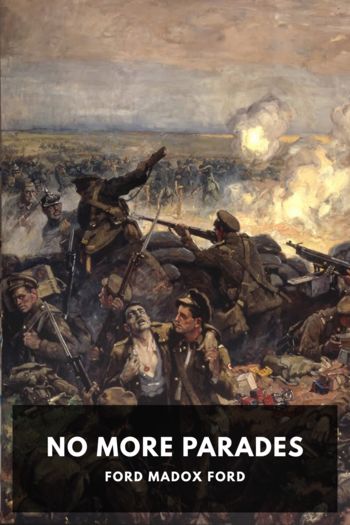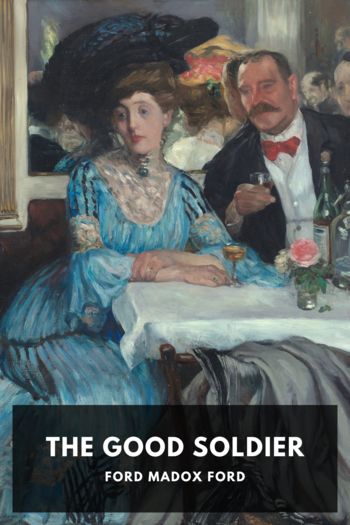Some Do Not … by Ford Madox Ford (story read aloud txt) 📕

- Author: Ford Madox Ford
Book online «Some Do Not … by Ford Madox Ford (story read aloud txt) 📕». Author Ford Madox Ford
“Keeper between the blankets!” Tietjens said to himself: “All these south country keepers sleep all night. … And then you give them a five quid tip for the weekend shoot. …” He determined that, as to that too he would put his foot down. No more weekends with Sylvia in the mansions of the Chosen People. …
The girl said suddenly; they had run into a clearing of the deep underwoods:
“I’m not stuffy with you over that Latin, though you were unnecessarily rude. And I’m not sleepy. I’m loving it all.”
He hesitated for a minute. It was a silly-girl thing to say. She didn’t usually say silly-girl things. He ought to snub her for her own sake. …
He had said:
“I’m rather loving it too!” She was looking at him; her nose had disappeared from the silhouette. He hadn’t been able to help it; the moon had been just above her head; unknown stars all round her; the night was warm. Besides, a really manly man may condescend at times! He rather owes it to himself. …
She said:
“That was nice of you! You might have hinted that the rotten drive was taking you away from your so important work. …”
“Oh, I can think as I drive,” he said. She said:
“Oh!” and then: “The reason why I’m unconcerned over your rudeness about my Latin is that I know I’m a much better Latinist than you. You can’t quote a few lines of Ovid without sprinkling howlers in. … It’s vastum, not longum … ‘Terra tribus scopulis vastum procurrit’ … It’s alto, not coelo … ‘Uvidus ex alto desilientis. …’ How could Ovid have written ex coelo? The c after the x sets your teeth on edge.”
Tietjens said:
“Excogitabo!”
“That’s purely canine!” she said with contempt.
“Besides,” Tietjens said, “longum is much better than vastum. I hate cant adjectives like ‘vast.’ …”
“It’s like your modesty to correct Ovid,” she exclaimed. “Yet you say Ovid and Catullus were the only two Roman poets to be poets. That’s because they were sentimental and used adjectives like vastum. … What’s ‘Sad tears mixed with kisses’ but the sheerest sentimentality!”
“It ought, you know,” Tietjens said with soft dangerousness, “to be ‘Kisses mingled with sad tears’ … ‘Tristibus et lacrimis oscula mixta dabis’. …”
“I’m hanged if I ever could,” she exclaimed explosively. “A man like you could die in a ditch and I’d never come near. You’re desiccated even for a man who has learned his Latin from the Germans.”
“Oh, well, I’m a mathematician,” Tietjens said. “Classics is not my line!”
“It isn’t,” she answered tartly.
A long time afterwards from her black figure came the words:
“You used ‘mingled’ instead of ‘mixed’ to translate mixta. I shouldn’t think you took English at Cambridge, either! Though they’re as rotten at that as at everything else, father used to say.”
“Your father was Balliol, of course,” Tietjens said with the snuffy contempt of a scholar of Trinity College, Cambridge. But having lived most of her life amongst Balliol people she took this as a compliment and an olive branch.
Some time afterwards Tietjens, observing that her silhouette was still between him and the moon, remarked:
“I don’t know if you know that for some minutes we’ve been running nearly due west. We ought to be going southeast by a bit south. I suppose you do know this road. …”
“Every inch of it,” she said, “I’ve been on it over and over again on my motor-bicycle with mother in the sidecar. The next cross road is called Grandfather’s Wantways. We’ve got eleven miles and a quarter still to do. The road turns back here because of the old Sussex iron pits; it goes in and out amongst them; hundreds of them. You know the exports of the town of Rye in the eighteenth century were hops, cannon, kettles and chimney backs. The railings round St. Paul’s are made of Sussex iron.”
“I knew that, of course,” Tietjens said: “I come of an iron county myself. … Why didn’t you let me run the girl over in the sidecar, it would have been quicker?”
“Because,” she said, “three weeks ago I smashed up the sidecar on the milestone at Hog’s Corner: doing forty.”
“It must have been a pretty tidy smash!” Tietjens said. “Your mother wasn’t aboard?”
“No,” the girl said, “suffragette literature. The sidecar was full. It was a pretty tidy smash. Hadn’t you observed I still limp a little?” …
A few minutes later she said:
“I haven’t the least notion where we really are. I clean forgot to notice the road. And I don’t care. … Here’s a signpost though; pull into it. …”
The lamps would not, however, shine on the arms of the post; they were burning dim and showing low. A good deal of fog was in the air. Tietjens gave the reins to the girl and got down. He took out the near light and, going back a yard or two to the signpost, examined its bewildering ghostlinesses. …
The girl gave a little squeak that went to his backbone; the hoofs clattered unusually; the cart went on. Tietjens went after it; it was astonishing; it had completely disappeared. Then he ran into it: ghostly, reddish and befogged. It must have got much thicker suddenly. The fog swirled all round the near lamp as he replaced it in its socket.
“Did you do that on purpose?” he asked the girl. “Or can’t you hold a horse?”
“I can’t drive a horse,” the girl said; “I’m afraid of them. I can’t drive a motorbike either. I made that up because I knew you’d say you’d rather have taken Gertie over in the sidecar than driven with me.”
“Then do you mind,” Tietjens said, “telling me if you know this road at all?”
“Not a bit!” she answered cheerfully. “I never drove it in my life. I looked it up on the map before we started because I’m sick to death of the road we went by. There’s a one-horse bus from Rye to Tenterden, and I’ve





Comments (0)